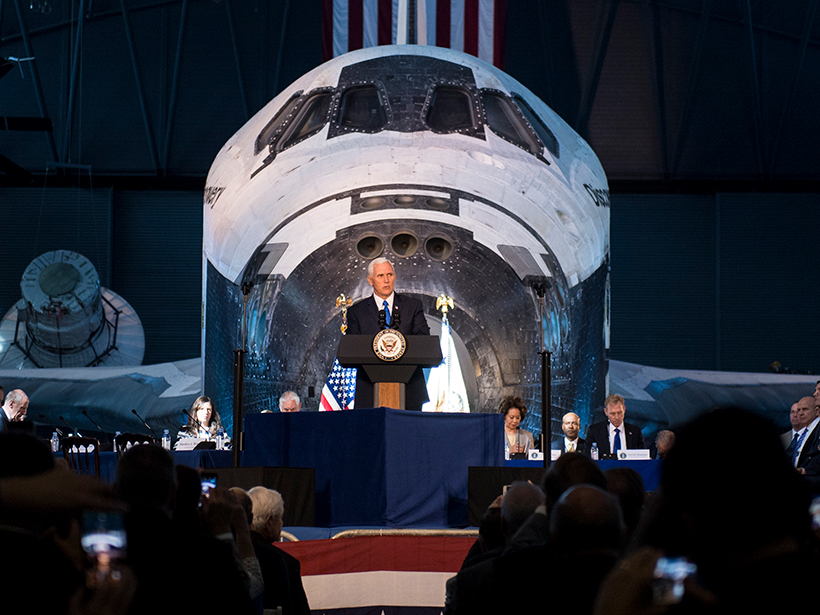U.S. Vice President Mike Pence promised the Moon last week during the first meeting of the reconstituted U.S. National Space Council.
“We will return American astronauts to the Moon, not only to leave behind footprints and flags, but to build the foundation we need to send Americans to Mars and beyond,” Pence said at the 5 October meeting at the Smithsonian National Air and Space Museum’s Steven F. Udvar-Hazy Center in Chantilly, Va.
“The Moon will be a stepping-stone, a training ground, a venue to strengthen our commercial and international partnerships as we refocus America’s space program toward human space exploration,” he said.
“The truth is that America entered this new millennium without a coherent policy, a coherent vision for outer space,” Pence said.
Pence, who chairs the council, said that the Trump administration wants to ensure America’s continued leadership in space; stressed the importance of space for civil, commercial, and national security activities; and castigated previous administrations for a national space program that “has suffered from apathy and neglect.”
Under the president’s leadership and the guidance of the space council, “the United States will usher in a new era of space leadership for our nation that will benefit every facet of our national life,” he said. “The truth is that America entered this new millennium without a coherent policy, a coherent vision for outer space. And in the absence of American leadership, other nations have seized the opportunity to stake their claim in the infinite frontier. Rather than lead in space, too often we have chosen to drift.” Pence called for the council to provide recommendations about space policy to the president within 45 days.
Some analysts, however, questioned some of Pence’s conclusions. In a 5 October analysis by Casey Dreier and Jason Davis of the Planetary Society, they said that “human spaceflight has lacked clear and consistent direction.” Nonetheless, they noted that “as far as civil space is concerned, NASA already leads in every conceivable metric.”
The Council’s Role
In a 30 June executive order, President Donald Trump revived the space council to review U.S. government space policy; develop recommendations on space policy and space-related issues; and foster coordination among civil, national security, and commercial space sectors, among other tasks. Council members, in addition to Pence, include seven other cabinet members, the NASA administrator, the chairman of the Joint Chiefs of Staff, and other officials.
The council, established in 1989 under President George H. W. Bush, had never dissolved but went dormant in 1993. An earlier version of the council had been established in 1958 near the beginning of the space race.
National Security Concerns
At last week’s half-day meeting, Pence said that the country struggled to define the direction and purpose of its space program following the triumphant Apollo missions to the Moon. The results of that “drift” include not having sent an American astronaut beyond low-Earth orbit in 45 years, continuing to rely on Russia to shuttle American astronauts to and from the International Space Station, and facing potential threats from other countries that “are aggressively developing jamming, hacking, and other technologies” that could damage military surveillance, navigation, and communication systems, he said.
“One of the important things this council can do is to ensure that we achieve the dominance in space necessary for us to protect our people,” said national intelligence director Coats.
Pence said that according to the U.S. intelligence community, “Russia and China are pursuing a full range of anti-satellite technology to reduce U.S. military effectiveness, and they are increasingly considering attacks against satellite systems as part of their future warfare doctrine.”
Council member and national intelligence director Dan Coats said that U.S. dominance in space is on its way to being equaled by adversaries. “As wonderful as it is to hear about the vision and the future for space and what it can provide commercially, what it can provide for human exploration,” we end up “sobered” by the fact that “there’s a dark side” to space endeavors by adversaries, he said. “One of the important things this council can do is to ensure that we achieve the dominance in space necessary for us to protect our people, to keep our adversaries in a position where they can’t provide the dominance that can do us wrong.”
Expert Testimony
During the meeting, the council also heard panels of experts speak about civil, commercial, and security issues related to space. In response to a question from Pence about the public concern to not militarize space, James Ellis, former commander of the U.S. Strategic Command and a speaker on the security panel, reminded the council that in 1962 President John F. Kennedy “said it is up to us to define whether the space domain becomes an ocean of peace, as he called it, or an area of conflict. We have that choice along with our allies.”
The council also heard from speakers on the civil space panel about the need to support and bolster commercial space activities. Marillyn Hewson, president and CEO of Lockheed Martin, said that to secure American leadership in space, the country needs clear and strong government leadership, visionary programs, and stable, sustained investment. “By taking these positive actions, we will enable industry to plan, invest, and innovate over the long term,” she said.
—Randy Showstack (@RandyShowstack), Staff Writer
Citation:
Showstack, R. (2017), Administration sets Moon as destination, Eos, 98, https://doi.org/10.1029/2017EO084175. Published on 09 October 2017.
Text © 2017. The authors. CC BY-NC-ND 3.0
Except where otherwise noted, images are subject to copyright. Any reuse without express permission from the copyright owner is prohibited.

